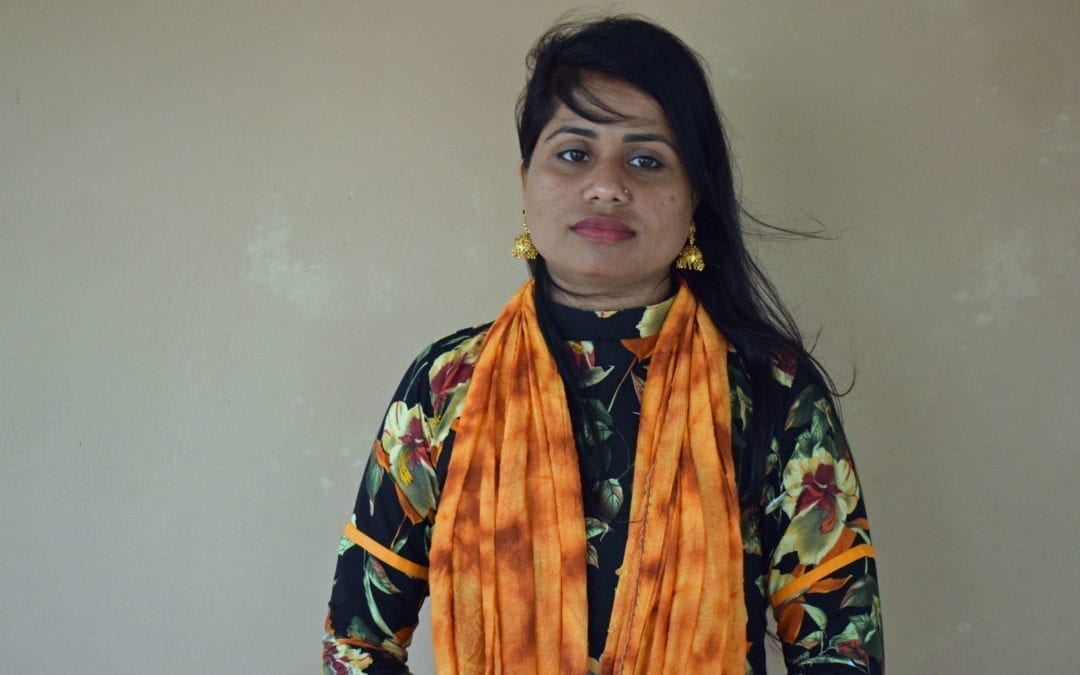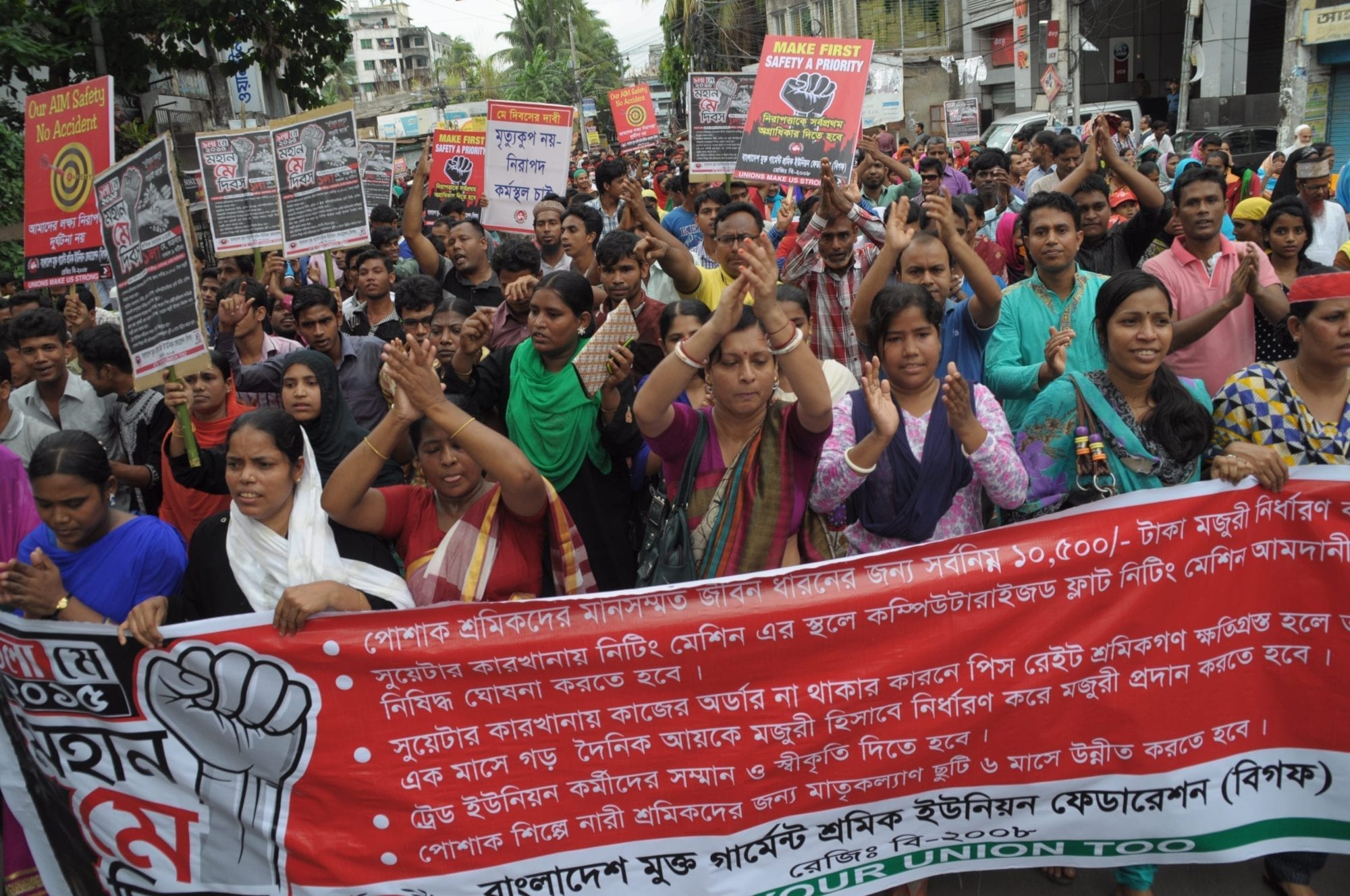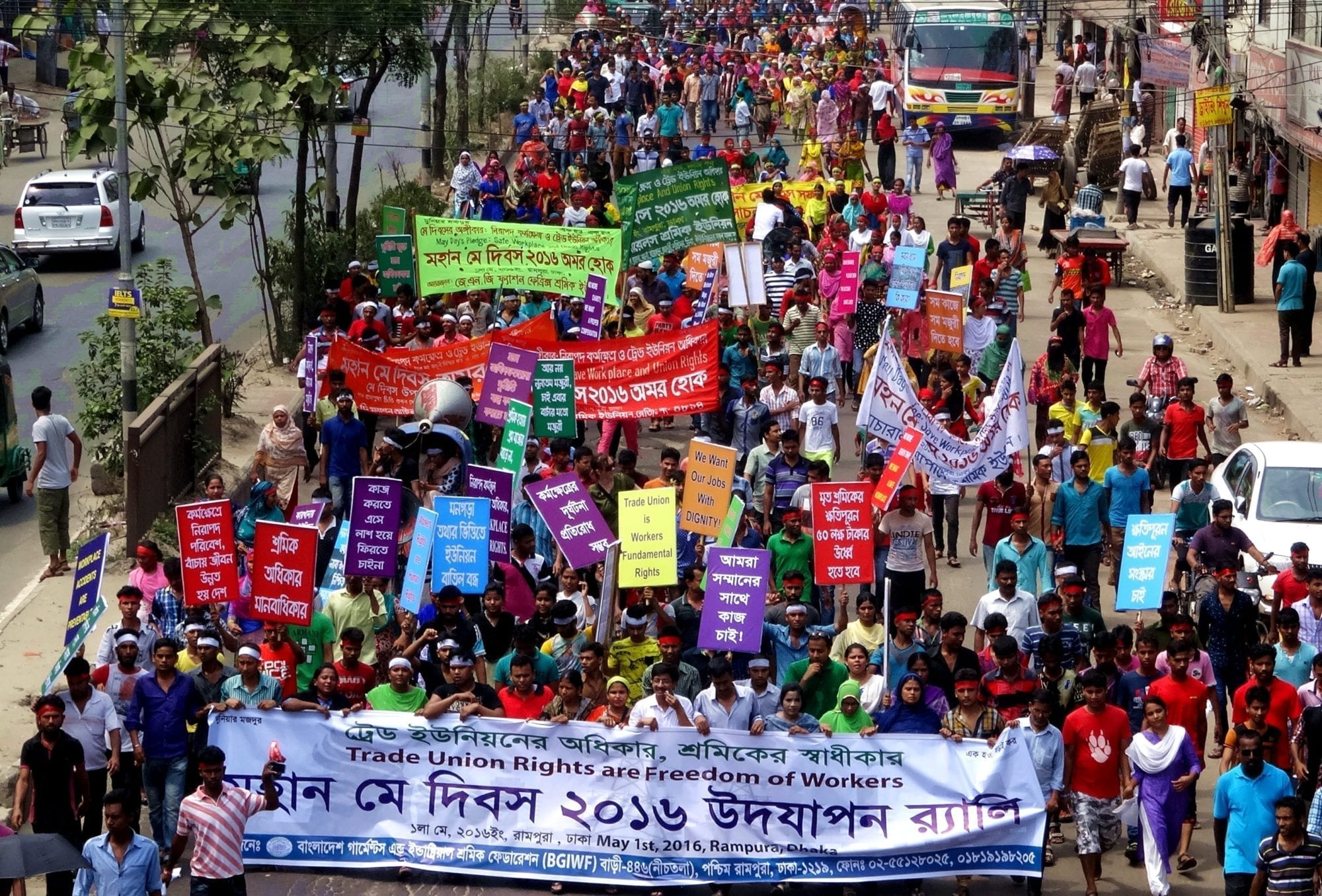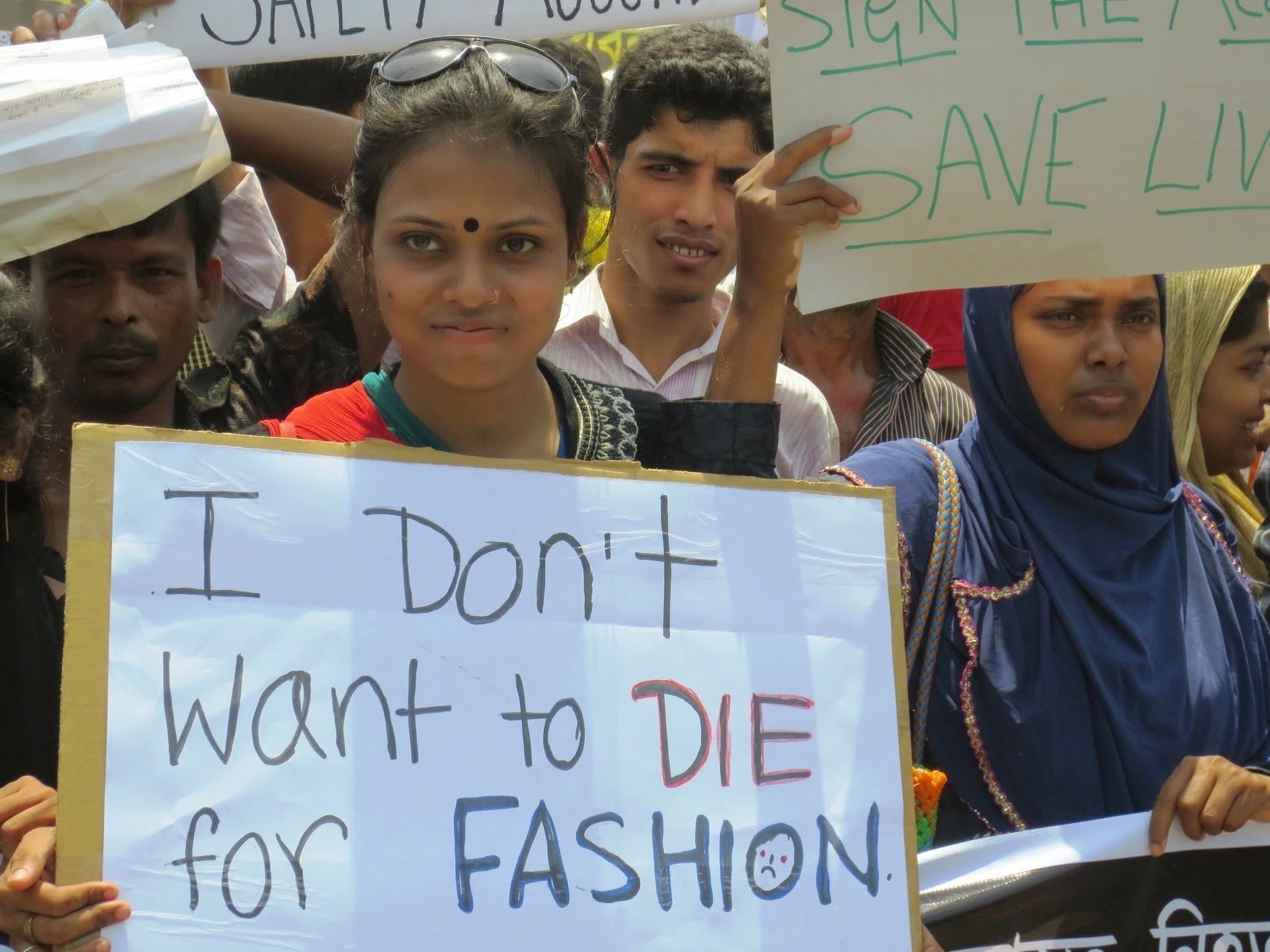
Apr 3, 2018
I am Monira Akter, working with Bangladesh Independent Garment Workers Union Federation (BIGUF) as an organizer for the past six years. I saw how my elder sister was abused and sometimes beaten in her garment factory, and that is when I decided that I wished to work for the rights and safety of all those brothers and sisters of the factory.
They were forced to work long hours without extra payment, sacked if absent for a day or two and had no trade union to voice their claims. It distressed me when I saw my sister returning home at night tired and sick with no time to spend with us or her husband. But we had no choice as we had five mouths to feed with no father or elder brother.
After the Rana Plaza disaster, there have been major changes which had not occurred in many years. Building and fire safety gave a sense of security for the workers in their workplace. They feel they will not lose theirs or their close ones’ lives in an accident just like Rana Plaza and thus are able to work feeling secured. Moreover, I am proud that we have been able to create leaders among the workers by organizing them into trade unions. In the past this would have been close to impossible.
I have worked day and night, went to gates of factories to talk to the workers, walked with them to their homes to earn their trust and to make them aware of how they are being exploited and deprived of their rights. So far, we have united 2,250 workers into trade unions and they say that we give them courage and hope. For me, these words are enough to encourage me to work on for them.
Some of their stories moved me. Once one of them told me that due to some reason a worker was ordered to leave the job immediately but instead she called our office right away. The manager seeing this told her to come back and keep working! This showed us how relevant we have become to the lives of workers and how we can influence the decisions of factory owners on worker rights.
A second story was about Mitu, a worker who was pregnant and submitted her resignation to management. She requested her benefits, but the manager would not allow it. She came to BIGUF informing us about her situation and we promised her our assistance. After many negotiations and heated conversations, we managed to extract all the dues she [legally] deserved without having to resort to legal proceedings.
This is how the garment workers lives are being transformed. The fact that I receive salary for this work is not my motivation. My husband discouraged me to work in this but I still adhere to my principles and wish to stay beside the workers who need of me.

Dec 29, 2017
As part of our year in review series, we are highlighting the 12 most popular Solidarity Center web stories of 2017. This story received the most reach on our Facebook page in January. Read the full story here.
The Solidarity Center warns that the broad crackdown on garment workers, union leaders and worker rights activists in Bangladesh marks a troubling escalation of efforts to silence garment workers and criminalize their fundamental rights to organize, speak to power and improve their lives and livelihoods.

Dec 26, 2017
As part of our year in review series, we are highlighting the 12 most popular Solidarity Center web stories of 2017. This story received the most reach on our Facebook page in April. Read the full story here.
As we approach April 24, the fourth anniversary of the Rana Plaza building collapse in Bangladesh that killed more than 1,130 garment workers and severely injured thousands more, the Solidarity Center is posting first-person stories of three garment worker union organizers who were arrested in December on baseless and dangerous charges, following wage strikes in the Ashulia garment district in December.
Mohammad Ronju, a long-time organizer with the Bangladesh Independent Garment Workers Union Federation (BIGUF) that has helped thousands of workers in 36 factories form unions, was one of the more than 35 people arrested in the December crackdown. On December 27, police entered the BIGUF office in Gazipur, arrested Ronju and later charged him in a January 2015 political opposition explosive substances case, in which he had no involvement. The case carries a sentence of three to twenty years in prison.

Nov 24, 2017
Five years is a lifetime in the fashion industry. The fast fashion cycle demands quicker and quicker turnarounds, sometimes in months or even weeks. This puts downward pressure on suppliers in terms of prices for the goods they produce and increases demands on workers, usually to work more for less. The last five years in the Bangladesh garment industry have been particularly dizzying, following the deadly November 24, 2012, Tazreen Fashions fire—and the Rana Plaza collapse six months after—that impelled intense, though not-quite permanent changes.
For workers and their unions, some changes have been historic and empowering. In an unprecedented burst of organizing in 40 years of the garment industry in Bangladesh, more than 400 unions recruited 90,000 new members. Now, however, we are seeing the government’s and industry’s reactions to that empowerment. Their dismissive attitude toward workers, their rights and their role in a booming sector runs the risk of harming not only Bangladesh garment workers but the very trade deals that make the country’s garment and textile sector its economic engine.
The young women union leaders of Bangladesh have surged forward against difficult odds, and the scars of the Tazreen factory fire that killed 112 garment workers are still raw. Many workers who were badly injured in the disaster, as documented by the Solidarity Center, are still unable to work. And the unions that workers continue to organize are facing an uphill battle for recognition, dignity and rights at work.
In 2012, prior to Tazreen, 12 unions applied for registration, a government requirement, and only one received it. Following Tazreen and with the world focused on how our clothes are made, 157 unions applied for registration and 84 were registered in 2013. Through their unions, the mostly woman workforce learned fire safety, gained maternity benefits and even improved their wages. But a backlash began to set in by 2015. Intimidated by employers determined to limit organizations that would represent worker interests, workers formed fewer unions.
Last December widespread labor unrest over poor wages in Ashulia, a suburb of Dhaka, led to hundreds of fired workers, police repression and trumped-up legal charges against worker rights activists. In response many Western clothing brands boycotted the annual high-profile “garment summit” in February, organized by the Bangladesh Garment Manufacturers and Exporters Association (BGMEA). In the spring the European Union (EU) held a first-ever meeting in Dhaka to discuss Bangladesh’s ill-treatment of workers and disregard for freedom of association in light of the garment industry’s preferential trade status. Still not getting the message, the Bangladesh police surveilled union activists, temporarily shut down union offices and raided worker education programs supported by the U.S. government, while ignoring coordinated attacks, verbal and otherwise, on labor organizers.
The events of the past year are building to a moment of truth for the government of Bangladesh and its garment sector. Bangladesh lost its preferential tariff benefits under the U.S. Generalized System of Preferences (GSP) in 2013, when the U.S. Trade Representative suspended it from the program. The EU has a similar tariff program and has demanded significant changes, to be unveiled this month, in Bangladesh’s labor law and practice in order to keep those benefits.
In a new white paper, the Clean Clothes Campaign, European Trade Union Confederation, International Trade Union Confederation and the IndustriALL and UNI global unions provide clear evidence that, despite signing a sustainability compact with the EU a year after the Tazreen fire, Bangladesh remains in violation of the deal. In the compact, the government pledged to reform labor laws, implement freedom of association in export-processing zones, improve union registration and curtail anti-union discrimination.
International Trade Union Confederation General Secretary Sharan Burrow says, “The government of Bangladesh is consistently failing to meet its obligations under international law to protect workers’ rights. The result is continued exploitation and poverty wages for workers in the garment industry. An EU investigation would help break the stranglehold that factory owners in Bangladesh have over the parliament and government, and would provide vital support for workers and their families.”
The EU has an important choice to make: whether to accept more empty promises from the Bangladesh government or institute a review of GSP trade benefits, the report’s authors say.
“Despite promises made, it is still extremely difficult for workers in Bangladesh to exercise their fundamental labor rights,” says Jenny Holdcroft, IndustriALL assistant general secretary. “The continued failure of the Bangladeshi government to take the necessary action to protect workers’ rights is ample reason for the EU to launch the much-needed trade investigation.” Bangladesh’s powerful employers and government have demonstrated little interest in changing the status quo, but a day of reckoning may be upon them. They can grant workers the respect and rights they deserve, or they can risk their flagship industry and economy. After five years, garment workers familiar with fast fashion are counting on eventual justice.
This is a crosspost from Thompson-Reuters.

Jul 5, 2017
At least 13 workers were killed and dozens injured when a boiler exploded at a garment factory in Bangladesh on Monday, ripping through the six-story building and causing a portion of it to collapse.
Officials have now called off the search for survivors. The death toll was not higher because most of the factory’s 5,000 garment workers were on holiday and not in the building, officials say.
Harunur Rashid, a worker at the factory, says the boiler’s safety light was flashing danger, but the device’s operators assured them there was nothing to worry about, according to reports in the Bangladesh news media.
“Within 10 minutes after we returned to work, the boiler exploded,” he says. “It’s absolutely the authorities’ negligence.”
Witnesses report the blast ripped doors, windows, machinery and a section of the second floor wall, all of which went airborne.
The plant in the Gazipur industrial district is owned by manufacturer Multifabs.




